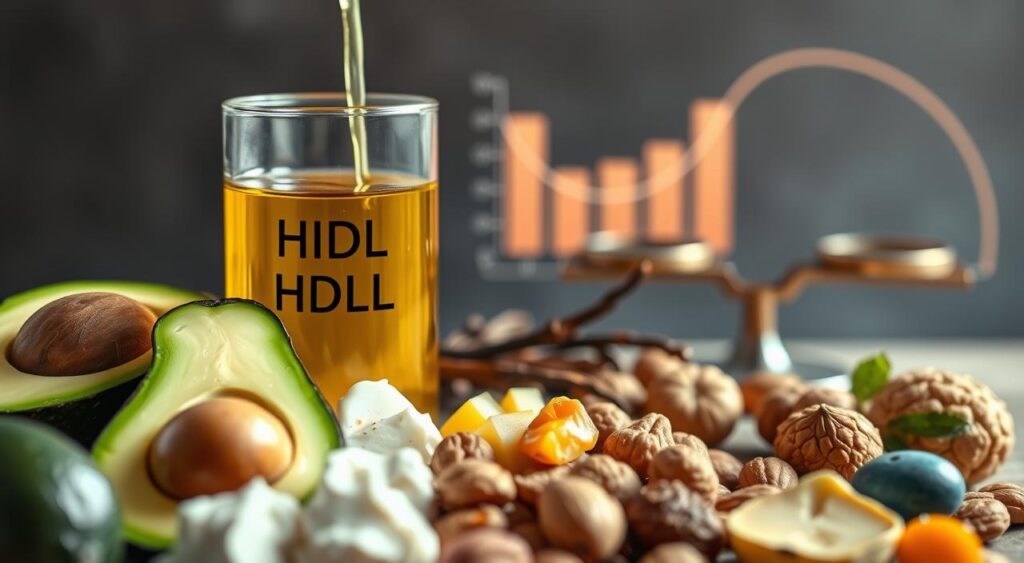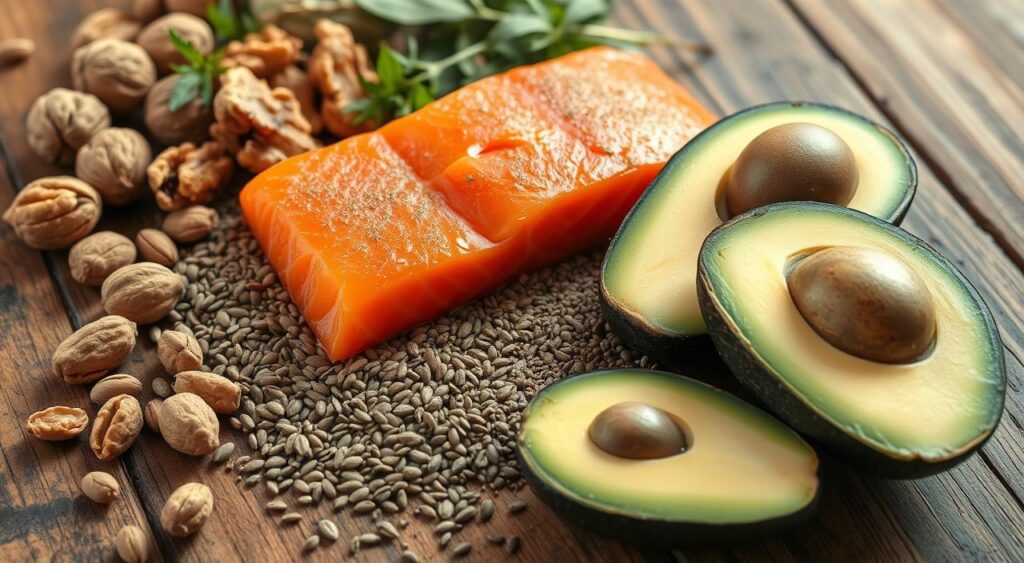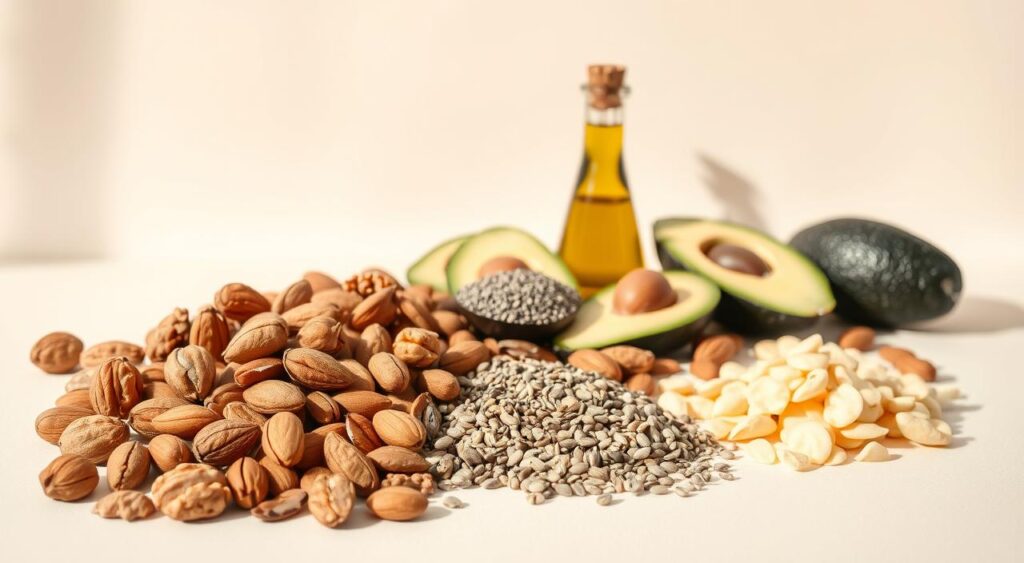Ever thought about how some fats can really up your HDL cholesterol and keep your heart safe? As we explore cardiovascular nutrition, it’s key to know the best fats for HDL. These fats are vital for boosting HDL and cutting down heart disease risk. You’ll learn about the HDL-boosting fats leading the way in heart health research. Let’s see how these fats can change your diet and improve your heart health!
Understanding HDL Cholesterol and Its Importance
HDL cholesterol is known as the “good” type of cholesterol. It’s key for keeping your health in check. It helps move cholesterol from your body’s tissues back to the liver, helping to balance cholesterol levels. Knowing how important HDL is can help you make better food choices and lifestyle habits, which supports your heart health.
What Is HDL Cholesterol?
HDL cholesterol, or high-density lipoprotein cholesterol, is a type of fat in your blood. Unlike LDL cholesterol, which can cause artery blockages, HDL protects you. It helps clear cholesterol from your blood, lowering heart disease risk. High HDL levels mean a lower risk of heart problems, making it vital to keep an eye on these levels.
Why HDL Levels Matter for Heart Health
HDL levels have a big impact on your heart health. Research shows that high HDL cholesterol can greatly reduce heart disease risk, even in people with obesity or metabolic syndrome. By focusing on HDL, you’re more likely to choose healthy foods and habits that raise these beneficial levels, improving your heart health.
The Role of Dietary Fats in Cholesterol Levels
Understanding dietary fats is key to managing cholesterol. Different fats can change your body’s cholesterol types and health. Knowing the types helps see how fats can boost HDL cholesterol.
Different Types of Dietary Fats
Dietary fats fall into three main categories: saturated, monounsaturated, and polyunsaturated. Each affects cholesterol differently. Saturated fats, found in animal products and some oils, can increase LDL cholesterol.
Monounsaturated fats, like those in olive oil and avocados, improve HDL cholesterol. Polyunsaturated fats, found in fish, nuts, and seeds, support heart health. They lower bad cholesterol and raise HDL.
How Fats Affect HDL Levels
Your diet affects HDL cholesterol and fats. Healthy fats can raise HDL and lower LDL. Plant-based fats are best for your body’s cholesterol balance.
Eating olive oil and nuts regularly boosts HDL levels. A balanced diet of fats is vital for heart health. It keeps HDL high without losing flavor or nutrition.

Best Monounsaturated Fats for Boosting HDL
Incorporating monounsaturated fats into your diet is key for boosting HDL cholesterol levels. Foods rich in these fats are great for heart health and offer many other benefits. Avocados and olive oil are top choices, full of nutrients for overall wellness.
Avocado: A Nutrient Powerhouse
Avocados are loved for their creamy texture and unique taste. They are packed with healthy fats that help raise HDL cholesterol. This fruit is also full of vitamins and minerals, making it a great addition to meals.
You can enjoy avocados in many ways. Try them sliced on toast, blended in smoothies, or in salads. They add a delicious touch to your diet and boost heart health.
Olive Oil: The Heart-Healthy Choice
Olive oil is famous for its health benefits and is a key part of the Mediterranean diet. It not only adds flavor but also boosts HDL cholesterol levels. Rich in antioxidants and polyphenols, it fights inflammation and supports heart health.
Drizzling olive oil over veggies or using it in dressings is a simple way to add these fats to your meals. It ensures your heart gets the support it needs.

Omega-3 Fatty Acids and HDL Improvement
Adding Omega-3 fatty acids to your diet boosts heart health, mainly by raising HDL cholesterol. These fats are known for their anti-inflammatory effects, which are key for a healthy heart. Knowing the sources of Omega-3s and their benefits helps you choose better foods.
Sources of Omega-3s
Many foods are packed with Omega-3 fatty acids, each bringing its own taste and nutrition. The top sources include:
- Fatty fish, such as salmon, mackerel, and sardines
- Walnuts
- Flaxseeds and flaxseed oil
- Chia seeds
- Hemp seeds
The Benefits of Fatty Fish
Fatty fish are packed with health benefits for your heart. Eating them regularly can:
- Boost HDL cholesterol, improving heart health
- Lower triglycerides, cutting heart disease risk
- Enhance brain function and thinking skills
- Reduce body inflammation
Enjoying the tastes and health perks of fatty fish and other Omega-3 sources can greatly improve HDL levels. Adding these foods to your diet helps manage cholesterol and supports heart health.

The Power of Polyunsaturated Fats
Polyunsaturated fats are key for heart health. They include Omega-3 and Omega-6 fatty acids, which boost HDL cholesterol. Eating nuts and seeds can greatly improve your heart health.
Nuts and Seeds: Healthy Snack Options
Nuts like almonds and walnuts are great snacks. They help keep cholesterol levels healthy and lower heart disease risk. These foods are full of nutrients like healthy fats, fiber, and vitamins.
Adding them to your diet supports heart health.
Flaxseed and Chia Seeds for a Nutritious Boost
Flaxseed and chia seeds are very beneficial. Flaxseed boosts HDL cholesterol with its omega-3 fatty acids. Chia seeds are rich in fiber and protein, making them a top choice for a healthy diet.
You can add them to smoothies, salads, or baked goods. This way, you get the most from these nutritious seeds.

Saturated Fats: Which Ones to Choose?
The talk about saturated fats can be tricky. But, some types are okay for a heart-healthy diet. Knowing about dark chocolate and coconut oil helps you enjoy them wisely.
Dark Chocolate: A Sweet Surprise
Dark chocolate has dark chocolate benefits beyond its taste. It’s full of flavonoids, which help raise HDL levels. This supports heart health. Choose dark chocolate with at least 70% cocoa for the best health benefits.
Coconut Oil: Moderation is Key
Coconut oil is loved by many for its health perks. It has saturated fats that boost HDL levels. But, too much can raise LDL cholesterol. So, use coconut oil in small amounts and mix it with other healthy fats.
Learning how to use these fats can improve your saturated fats choices. This can help your heart health a lot.
Incorporating Healthy Fats into Your Diet
Adding healthy fats to your meals can really change your diet for the better. It’s easy to cook with healthy fats to boost your HDL cholesterol. With the right recipes, making healthy fats a part of your daily meals becomes fun and simple.
Tips for Cooking with Healthy Fats
Using healthy fats in cooking is simple. Here are some tips:
- Begin with extra virgin olive oil for dressings and sautéing for heart health.
- Add avocado to meals, like mashed on toast or in salads, for creaminess and nutrition.
- Top yogurt or oatmeal with nuts and seeds for flavor and health benefits.
- Try different herbs and spices to make dishes with healthy fats taste great.
Easy Recipes to Increase Your HDL
Here are some tasty recipes to help you enjoy healthy fats:
| Recipe | Main Ingredients | Healthy Fat Source |
|---|---|---|
| Avocado Toast | Sourdough bread, avocado, cherry tomatoes | Avocado |
| Olive Oil Dressing | Extra virgin olive oil, balsamic vinegar, garlic | Olive Oil |
| Salmon Salad | Grilled salmon, mixed greens, walnuts | Fatty Fish, Walnuts |
| Chia Seed Pudding | Chia seeds, almond milk, honey | Chia Seeds |
These simple recipes show how easy it is to add healthy fats to your meals. By choosing wisely, you can enjoy tasty food that’s also good for your heart and raises your HDL levels.
Foods to Avoid for Optimal HDL Levels
To keep your HDL levels high, it’s important to know which foods to skip. Some foods can really affect your cholesterol levels. It’s key to cut down on trans fats and processed foods for better heart health.
Trans Fats and Their Impact
Trans fats are bad for your health. They’re in baked goods, margarine, and fried foods. They can lower your HDL cholesterol and raise the bad LDL cholesterol.
It’s vital to check food labels and avoid items with partially hydrogenated oils. These are common sources of trans fats.
Processed Foods: Why to Steer Clear
Processed foods can harm your cholesterol levels. They often have unhealthy fats, sugars, and sodium but lack nutrients. Eating these foods regularly can make it hard to keep your HDL levels up.
Choosing whole, unprocessed foods like fruits, veggies, and whole grains is a good move. It can help improve your heart health.
Monitoring and Maintaining Your HDL Levels
Checking your HDL levels regularly is key to knowing your heart health. Learning about HDL testing helps you understand your cholesterol numbers better. A higher HDL level is good because it helps protect against heart disease.
By getting your cholesterol checked often, you can see how you’re doing. This helps you know what changes you might need to make for better health.
Regular Testing: Understanding Your Numbers
When you get your cholesterol tested, look at your total cholesterol, HDL, and LDL levels. Knowing these numbers helps you make better choices for your health. Use them to set goals for yourself and work towards improving your HDL levels.
Lifestyle Changes for Long-Term Health
Healthy lifestyle changes can greatly improve your heart health. Being active, managing stress, and eating foods rich in healthy fats help your HDL levels. By making these changes, you’ll not only feel better but also keep your cholesterol levels healthy for the future.




Pingback: 15 Best Heart-Healthy Foods Backed by Science (And What to Avoid)
Pingback: Cholesterol Lowering Foods Backed by Science: Eat These to Protect Your Heart